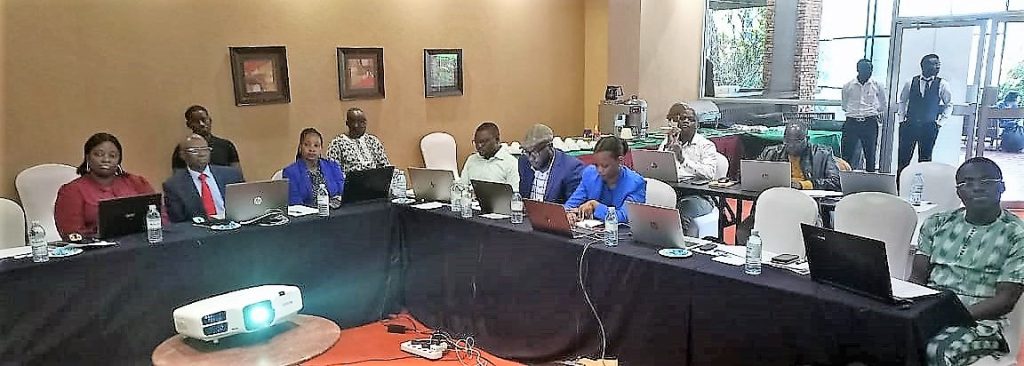
African scientists under the umbrella of the “Responsible Artificial Intelligence Network for Climate Action in Africa (RAINCA)” met in Kampala, Uganda, from 3 to 5 April 2023. The meeting was an Orientation programme for Principal Investigators (PIs) of the grantees of the RAINCA initiative for the implementation of independent research projects in different sectors such as agriculture, forestry, electricity, and the blue economy. The meeting attracted participants from several institutions from different parts of Africa such as Cameroon in Central Africa; Ghana, Senegal, Cote d’Ivoire, Nigeria, and Benin in West Africa; and Ethiopia, Tanzania, and Uganda in Eastern Africa.
The main objectives of the meeting were to provide proper orientation to the successful grantees on climate change, opportunities in artificial intelligence research, artificial intelligence community building and to share knowledge and experiences from the different grantees under the RAINCA consortium. The programme was also primed to develop the capacity of RAINCA grantees to track progress, document, report and share lessons on the implementation processes.
RAINCA is coordinated by a consortium of three partner African organizations, namely, West African Science Service Centre on Climate Change and Adapted Land Use (WASCAL), Regional Universities Forum for Capacity Building in Agriculture (RUFORUM) and AKADEMIYA2063. The three organizations have vast experiences and capacities in climate change, agricultural research and artificial intelligence.
Participants at the programme noted that with the increasing build-up of greenhouse gases in the atmosphere, the resulting variability and change in climate has led to the occurrence of extreme temperatures and larger mean and maximum one-day precipitation around the world. According to Intergovernmental Panel on Climate Change (IPCC), Africa is projected to be the hardest hit by the impacts of climate change. If not mitigated, climate change will affect the livelihoods of the most vulnerable communities in Africa due to the inherent low adaptive capacity and projected impacts of climate change.
However, participants also noted that climate change provides ample opportunities for Africa to strengthen its scientific capacity. It also noted that climate change has stimulated more African research institutions and experts to explore new frontiers of science to mitigate the impacts of climate change and increase the adaptive capacity of the most vulnerable populations, such as smallholder farmers who depend on rain-fed agriculture.
On this note, participants emphasised the fact that research in artificial intelligence remains an untapped “gold mine” for Africa to better respond to the challenges of climate change. It was also happy to note that interest in artificial intelligence is growing among policymakers and development partners.
Through artificial intelligence, researchers in the RAINCA initiative will be able to use sophisticated models to predict the impacts of climate change and provide decision-support tools to allow policymakers respond appropriately climate change issues. Furthermore, innovations enable communities better adapt and mitigate climate change impacts. The organizers of the programme stated that RAINCA will create a network of Climate Champions in Africa who will be empowered to apply artificial intelligence to predict and respond to climate change. The hub will also continue to create climate awareness and resilience and also build research capacity in Africa through the use of artificial intelligence.
According to the participants, the programme enabled them to gain additional skills in research in artificial intelligence, learn inclusive strategies to engage marginalized groups including women and youth and fostered a community of artificial intelligence researchers in Africa. One of the participants from the University of Bamenda, Cameroon who is using artificial Intelligence for modelling climate change in the Congo Basin remarked that “the orientation meeting has provided me the opportunity to network with other scientists and discuss modalities to share knowledge and resources such as the use and development of unmanned vehicles for data collection”. Another participant from Nelson Mandela African Institution of Science and Technology, Tanzania noted that “through this orientation meeting, I have gained new insights to involve communities is collecting audio and text data to build an artificial intelligence model that will help to predict and mitigate forest fires”. Michele Leone, the Program Officer at International Development Research Centre (IDRC) who attended the meeting physically noted that “the orientation meeting has provided me with a better understanding of research being undertaken by the research teams and gives insight for scaling responsible artificial intelligence in Africa to improve livelihoods and build resilience to climate change”.
RAINCA focuses on climate change because it presents both a challenge and an opportunity for Africa. According to the Intergovernmental Panel on Climate Change (IPCC), climate change refers to any change and variability in climate over a long period of time, whether due to natural variability or human activity, that is statistically significant. The issue of climate change is particularly significant for Africa as the continent also emerges from the COVID-19 pandemic, which increased the population’s vulnerability to existing shocks such as climate change and other emerging and re-emerging shocks.
The RAINCA initiative is being implemented to advance climate action in Africa through the responsible development and deployment of AI innovations. Specifically, the initiative will deepen understanding of how to develop and scale responsible AI innovations for climate action in sub-Saharan Africa, build the capacity of 11 groups of African innovators and researchers to develop, deploy, and scale responsible AI applications in climate action. It will also facilitate the contribution of African research to international AI policy and practice conversations.
RAINCA is funded by the Artificial Intelligence for Development-Africa (AI4D) programme, a joint initiative funded by Canada’s International Development Research Centre (IDRC) and the Swedish International Development Agency (SIDA). Visit https://rain-ca.org/ for more information.
The programme ended in a relaxed and colorful style with a group excursion to Kampala and Jinja to network and for participants to appreciate the Ugandan rich culture and landscape.
About the Author:
Mr. David Ekepu is a Technical Specialist in the Office of the Executive Assistant to the Executive Secretary, RUFORUM. David doubles as a Project Officer with the RAINCA at RUFORUM.

